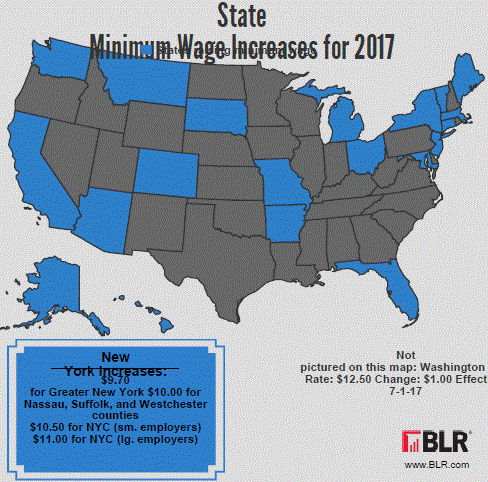State Minimum Wage Increases for 2017 (Map)
by Susan Prince
Tuesday, December 6th, 2016 - HR Daily Advisor
Minimum wage increases will affect numerous states across the country in January 2017.
Under the Fair Labor Standards Act (FLSA), the current federal minimum wage is $7.25 per hour, but the FLSA does not supersede any state or local laws that are more favorable to employees. Therefore, if a state has a minimum wage that is higher than the federal minimum, employers subject to the state minimum wage law are obligated to pay the higher rate to employees working in that state.
The map below shows the states that are increasing their minimum wages, including the new rate and amount of the increase. We also provide a listing of the states increasing their minimum wages and the effective dates of the changes below the map.
State minimum wage changes effective January 1, 2017
Alaska: $9.80 per hour.
Arizona: $10.00 per hour. The minimum wage is also scheduled to increase to $10.50 per hour on January 1, 2018.
Arkansas: $8.50 per hour.
California: $10.50 per hour. The minimum wage is also scheduled to increase to $11.00 per hour on January 1, 2018.
Colorado: $9.30 per hour. The minimum wage is also scheduled to increase to $10.20 per hour on January 1, 2018.
Connecticut: $10.10 per hour.
Florida: $8.10 per hour.
Hawaii: $9.25 per hour. The minimum wage is also scheduled to increase to $10.10 per hour on January 1, 2018.
Maine: $9.00 per hour. The minimum wage is also scheduled to increase to $10.00 per hour on January 1, 2018.
Massachusetts: $11.00 per hour.
Michigan: $8.90 per hour. The minimum wage is also scheduled to increase to $9.25 on January 1, 2018.
Missouri: $7.70 per hour.
Montana: $8.15 per hour.
New Jersey: $8.44 per hour.
New York:
- $9.70 per hour for Greater New York
- $10.00 per hour for Nassau, Suffolk, and Westchester counties
- $10.50 for New York City (small employers)
- $11.00 for New York City (large employers)
Ohio: $8.15 per hour (gross receipts of $297,000 or more); $7.25 per hour (gross receipts under $297,000)
South Dakota: $8.65 per hour.
Vermont: $10.00 per hour. The minimum wage is also scheduled to increase to $10.50 per hour on January 1, 2018.
Washington: $11.00 per hour. The minimum wage is also scheduled to increase to $11.50 per hour on January 1, 2018.
State minimum wage changes effective July 1, 2017
Washington D.C: $12.50 per hour on July 1, 2017. The minimum wage is also scheduled to increase to $13.25 per hour on July 1, 2018.
Maryland: $9.25 per hour on July 1, 2017. The minimum wage is also scheduled to increase to $10.10 per hour on July 1, 2018.
Minimum wage basics
The federal FLSA requires that a minimum wage be paid for all hours an employee is gsuffered or permittedh to work and that an overtime wage be paid for all hours gworkedh over 40 in a week. The FLSA does not specifically define ghours workedh or place a limit on the number of hours an employee may work; it requires only that overtime be paid for any hours worked over 40.
Generally speaking, work time includes all time that employees spend engaged in the principal activities that they are employed to perform. Hours worked can also include waiting time; travel time, other than time spent commuting to and from the employeefs regular place of work; breaks or meal periods that are less than 20 minutes long; and time the employee is required to spend in training, at seminars, or in meetings.
Hours worked for purposes of the FLSA does not include time spent on call, time spent waiting to work, or time when an employee is required to carry a pager or cell phone, provided the employee is otherwise free to effectively use the time for his or her own personal purposes. The FLSA does not obligate employers to pay employees for holidays, vacation, or sick days.
Under the de minimis rule, employers may disregard insubstantial or insignificant periods of time beyond the scheduled working hours, if, as a practical administrative matter, such time cannot be precisely recorded. If employees are checking e-mails for 2 or 3 minutes, employers will likely not have to pay for this time. But if employees are spending 10 to 15 minutes after work hours, employers will have to pay employees for this work time.
The rules are strict, but the penalties are stricter. Paying employees properly now will help you to avoid expensive fines, claims, and lawsuits down the line.
What state minimum wage changes have already taken place in 2016? See our previous minimum wage map.
